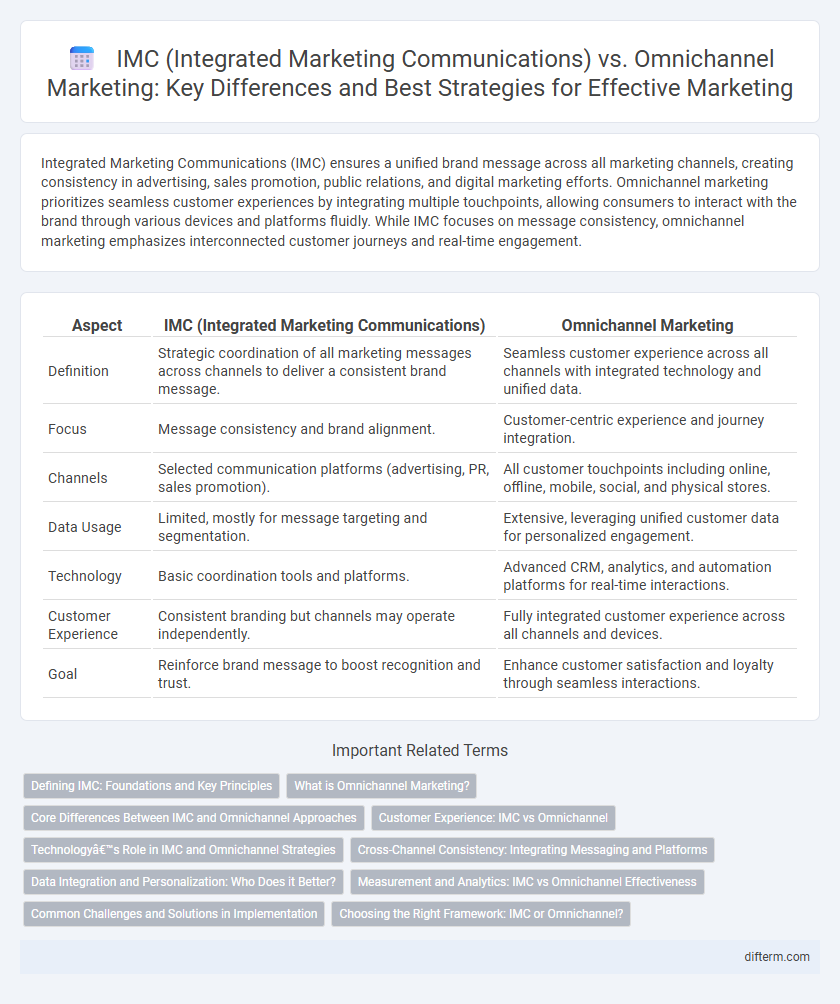Integrated Marketing Communications (IMC) ensures a unified brand message across all marketing channels, creating consistency in advertising, sales promotion, public relations, and digital marketing efforts. Omnichannel marketing prioritizes seamless customer experiences by integrating multiple touchpoints, allowing consumers to interact with the brand through various devices and platforms fluidly. While IMC focuses on message consistency, omnichannel marketing emphasizes interconnected customer journeys and real-time engagement.
Table of Comparison
| Aspect | IMC (Integrated Marketing Communications) | Omnichannel Marketing |
|---|---|---|
| Definition | Strategic coordination of all marketing messages across channels to deliver a consistent brand message. | Seamless customer experience across all channels with integrated technology and unified data. |
| Focus | Message consistency and brand alignment. | Customer-centric experience and journey integration. |
| Channels | Selected communication platforms (advertising, PR, sales promotion). | All customer touchpoints including online, offline, mobile, social, and physical stores. |
| Data Usage | Limited, mostly for message targeting and segmentation. | Extensive, leveraging unified customer data for personalized engagement. |
| Technology | Basic coordination tools and platforms. | Advanced CRM, analytics, and automation platforms for real-time interactions. |
| Customer Experience | Consistent branding but channels may operate independently. | Fully integrated customer experience across all channels and devices. |
| Goal | Reinforce brand message to boost recognition and trust. | Enhance customer satisfaction and loyalty through seamless interactions. |
Defining IMC: Foundations and Key Principles
Integrated Marketing Communications (IMC) is a strategic approach that unifies all marketing channels and messages to deliver a consistent brand experience and maximize impact. It focuses on aligning advertising, public relations, sales promotion, and digital marketing to ensure cohesive communication with target audiences. Key principles of IMC include message consistency, customer-centricity, and synergy among diverse marketing tactics to strengthen brand equity and drive engagement.
What is Omnichannel Marketing?
Omnichannel marketing is a strategic approach that creates a seamless and consistent customer experience across all channels and touchpoints, integrating online and offline interactions. It leverages data analytics and real-time customer insights to personalize communication and deliver cohesive brand messaging. Unlike traditional IMC, omnichannel marketing emphasizes continuous engagement and fluid transitions between channels, enhancing customer satisfaction and loyalty.
Core Differences Between IMC and Omnichannel Approaches
IMC (Integrated Marketing Communications) centralizes messaging across all marketing channels to deliver a consistent brand voice, ensuring cohesive consumer perceptions and unified promotional efforts. Omnichannel marketing focuses on creating seamless, personalized customer experiences across multiple touchpoints, integrating online and offline interactions to enhance engagement and satisfaction. The core difference lies in IMC's emphasis on message consistency, while omnichannel prioritizes interconnected customer journeys across platforms.
Customer Experience: IMC vs Omnichannel
Integrated Marketing Communications (IMC) aligns messaging across multiple channels to ensure consistency and reinforce brand identity, enhancing customer recognition and trust. Omnichannel marketing, however, prioritizes a seamless and personalized customer experience by integrating all platforms, touchpoints, and devices to deliver real-time interactions. While IMC focuses on cohesive brand communication, omnichannel marketing emphasizes unified customer journeys that adapt dynamically to individual preferences and behaviors.
Technology’s Role in IMC and Omnichannel Strategies
Technology drives Integrated Marketing Communications (IMC) by enabling consistent messaging across multiple channels through advanced data analytics, CRM systems, and marketing automation platforms. Omnichannel marketing leverages real-time technology integration, such as AI-powered customer insights and seamless cross-device experiences, to deliver personalized interactions at every touchpoint. Both strategies rely heavily on robust technological frameworks to synchronize campaigns, optimize customer journeys, and boost overall marketing effectiveness.
Cross-Channel Consistency: Integrating Messaging and Platforms
Integrated Marketing Communications (IMC) emphasizes unifying messaging across all marketing channels to create a consistent brand voice and strengthen customer recognition. Omnichannel marketing takes this further by seamlessly integrating multiple platforms, ensuring customers experience a cohesive journey whether interacting online, in-store, or via mobile. Cross-channel consistency in omnichannel strategies enhances customer engagement and drives higher conversion rates by delivering personalized and synchronized communications across touchpoints.
Data Integration and Personalization: Who Does it Better?
Integrated Marketing Communications (IMC) excels in delivering a unified brand message across channels by aligning messaging strategies, but often lacks deep data integration for personalized customer experiences. Omnichannel marketing leverages advanced data integration technologies to create seamless, personalized interactions across multiple touchpoints, driving higher customer engagement and loyalty. When it comes to data integration and personalization, omnichannel marketing outperforms IMC by using real-time analytics to tailor content and offers uniquely for each customer journey stage.
Measurement and Analytics: IMC vs Omnichannel Effectiveness
Measurement and analytics in Integrated Marketing Communications (IMC) focus on assessing the consistency and impact of unified messaging across multiple channels, relying heavily on tools like surveys, brand lift studies, and attribution modeling to gauge brand awareness and engagement. Omnichannel marketing employs advanced real-time data analytics and customer journey mapping to track individual touchpoints, enabling precise optimization of personalized experiences and conversion rates across all platforms. Comparing effectiveness, omnichannel marketing generally offers more granular insights into customer behavior, enhancing ROI by integrating seamless cross-channel tracking and predictive analytics.
Common Challenges and Solutions in Implementation
IMC and omnichannel marketing both face challenges such as inconsistent messaging, data silos, and difficulty measuring ROI across multiple channels. Ensuring seamless customer experiences requires unified data management platforms, cross-departmental collaboration, and real-time analytics integration. Solutions often involve adopting advanced CRM systems, standardized brand guidelines, and leveraging AI-driven insights to align campaigns and optimize customer engagement across all touchpoints.
Choosing the Right Framework: IMC or Omnichannel?
Choosing the right framework depends on whether your goal is to create consistent messaging across multiple channels, which aligns with Integrated Marketing Communications (IMC), or to provide a seamless, personalized customer experience through interconnected channels, characteristic of omnichannel marketing. IMC emphasizes harmonized brand messaging to build strong brand equity, while omnichannel prioritizes customer journey integration to enhance engagement and retention. Evaluating your business objectives, target audience behavior, and channel capabilities will determine whether IMC's unified communication or omnichannel's customer-centric approach better supports your marketing strategy.
IMC (integrated marketing communications) vs omnichannel marketing Infographic

 difterm.com
difterm.com